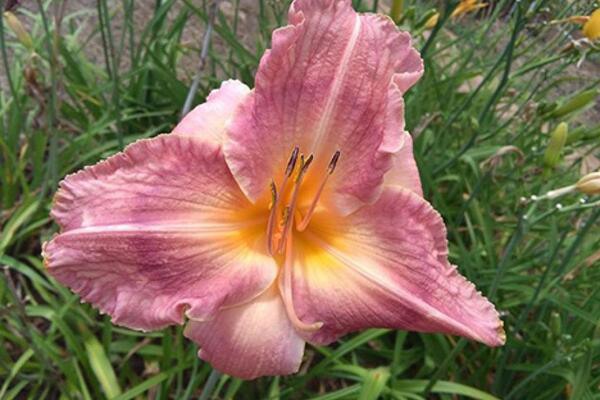The daylily is a member of the Hemerocallis species and is cultivated in every state and most, if not all, regions of the world. Despite its rich environmental, nutritional, medicinal, and research history, daylily’s economies evolve mainly around the beauty of its flowers. The diversity and complexity of its colors are unparalleled across ornamental crops. With support from NIFA, Langston University in Oklahoma has developed the sole and largest genetic stock of more than 250 daylily cultivars, most of which are semi-evergreen.
Challenges
The floral beauty that is the cornerstone of the daylily’s economy only lasts 24 hours because programmed death genes are prone to precisely kill the flower at the end of this period, under standard conditions. To meet the increasing market demand, cell and tissue culture techniques are increasingly used for commercial purposes in a daylily.
Many farmers, enthusiasts, and some breeders have complained that the phenotypes of alleged tissue culture-produced plants differ from the parents. This has infused increasing skepticism toward tissue culture technologies, which is greatly impeding the improvement of this crop using modern technologies. Most protocols for daylily micropropagation are difficult to reproduce, which limits its broad commercial and research applications.
Solution
The plan is to implement adequate measures to address those challenges more efficiently, amongst which include:
- Develop organ-specific reproducible micropropagation protocols.
- Determine the number, structure, and functions of genes involved in killing floral cells within 24 hours of blooming.
- Developing genetically modified (GM) cultivars by integrating organ-specific reproducible micropropagation protocols with silenced death genes.
- Integrate GM cultivars into breeding programs to develop mass cultivars with a longer blooming period.
Langston University Research Approach to Tackling the Challenges
The Langston University School of Agriculture and Applied Sciences, through its Evans-Allen Grant program funded by USDA’s National Institute of Food and Agriculture, is conducting research to address the challenges in three phases:
- Phase 1 – Develop more efficient organ-specific micropropagation protocols that result in true-to-parent phenotypes reproducibly.
- Phase 2 – Determine all or most genes involved in the 24-hour-programmed death of flower cells.
- Phase 3 – Integrate the products of phases 1 and 2 to develop GM plants that produce flowers that last longer than 24 hours up to several days. This will increase the research and economic values of the crop. The products of Phase 3 will be integrated into plant breeding programs for long-term broader applications.
Selected Impacts of the Project Research
- Langston University has developed the sole and largest genetic stock of more than 250 cultivars, most of which are semi-evergreen, in Oklahoma.
- The results disprove erroneous beliefs among many farmers and some breeders that tissue culture technologies cause the loss of parental phenotypes in progenies. The research shows that proper application of tissue culture technologies will lead to expected results in which parental phenotypes are faithfully reproduced in progenies.
- Langston’s daylily research program has successfully developed micropropagation methods that induced new plants in all standard crop’s plant organs, including root, stem, floral organ, and bract.
- The results demonstrate that protocols developed using stem, bract, and floral bud as principal explants are the most effective and consistently reproducible under room conditions.
- The research results also show for the first time that, when a whole flower bud is used as the primary explant, shoot organogenesis will develop decreasingly from the ovarian region toward the tip of the perianth.
- Short-term research targets following floral gene determination include developing genetically modified (GM) plants using genetic transformation and CRISPR-Cas 9 technologies. The resulting GM genotypes will be introduced into plant breeding programs at Langston as well as at other institutions of higher education.
Most Oklahoma farmers who have attended Dr. Matand’s presentations on daylily research through Langston’s Extension Service activities have expressed hope and greater interest in the crop, especially after hearing about the possibility of future development of cultivars with flowers’ longer life span.
For more information, contact Dr. Kanyand Matand at kmatand@langston.edu.
For more information:
U.S. Department of Agriculture
+1 202 720 2791
askusda@usda.gov
www.usda.gov
